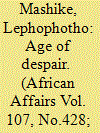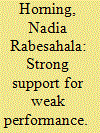| Srl | Item |
| 1 |
ID:
082669


|
|
|
|
|
| Publication |
2008.
|
| Summary/Abstract |
The creation of a new national defence force in South Africa produced ex-combatants - a social group possessing military skills and access to small arms but without opportunities to exercise their skills. Since 2000, former combatants from various military backgrounds have participated in or planned protest action to demand jobs or integration into the national defence force. To date there has been no scholarly attempt to explain the sporadic protest action by former combatants in South Africa. The purpose of this article is to account for the various protest actions by former combatants since 2000. The main argument is that many former combatants who were unable to make careers in the post-apartheid national defence force have failed to reintegrate successfully into civilian society. Consequently, some of them have mobilized to highlight their grievances. While there is nothing inherently wrong with peaceful protest action, the easy access to small arms in South Africa increases the potential for violent conflict
|
|
|
|
|
|
|
|
|
|
|
|
|
|
|
|
| 2 |
ID:
082666


|
|
|
|
|
| Publication |
2008.
|
| Summary/Abstract |
Across Africa, many countries have taken initiatives to increase the participation and representation of women in governance. Yet it is unclear what meaning these initiatives have in authoritarian, single-party states like Rwanda. Since seizing power in 1994, the Rwandan Patriotic Front has taken many steps to increase the participation of women in politics such as creating a Ministry of Gender, organizing women's councils at all levels of government, and instituting an electoral system with reserved seats for women in the national parliament. This article explores the dramatic increase in women's participation in public life and representation in governance and the increasing authoritarianism of the Rwandan state under the guise of 'democratization'. The increased political participation of women in Rwanda represents a paradox in the short term: as their participation has increased, women's ability to influence policy making has decreased. In the long term, however, increased female representation in government could prepare the path for their meaningful participation in a genuine democracy because of a transformation in political subjectivity
|
|
|
|
|
|
|
|
|
|
|
|
|
|
|
|
| 3 |
ID:
082667


|
|
|
|
|
| Publication |
2008.
|
| Summary/Abstract |
Recent analyses of Sierra Leone's eleven-year civil war have argued that the conflict was fuelled by a crisis within chiefdom authority, with emphasis on increasing tensions between rural youth and their elders. However, a counter-argument has also emerged, emphasising that customary authority is still highly regarded in post-conflict Sierra Leone and that chiefs act as an influential barrier against bureaucratic abuses of power. This article draws on fieldwork from three districts in Sierra Leone to argue that chiefdom authority indeed continues to have considerable support. In particular, section chiefs and headmen are seen as being particularly important for settling small disputes, especially in the rural areas where contact between villagers and chiefs is most apparent
|
|
|
|
|
|
|
|
|
|
|
|
|
|
|
|
| 4 |
ID:
082668


|
|
|
|
|
| Publication |
2008.
|
| Summary/Abstract |
Since independence, Madagascar's ability to meet its development and environmental goals has remained weak. Yet Madagascar has never suffered a shortage of foreign assistance. What explains such a paradox? This article argues that the gap between foreign aid and development performance is rooted in donor competition to give aid for the purpose of advancing their foreign interests. In turn, the state exploits this donor competition to stay afloat. This process of exploiting aid creates a situation of mutual dependency between donors and the state. This is a departure from theories that attribute poor performance solely to recipient countries' aid dependency. The article examines state-donor relations in Madagascar's environmental sector in the past two decades. It suggests that influencing government policies (for donors) and resource capture and redistribution (for the state), rather than conservation per se, are the de facto goals of conservation politics. It then assesses the extent to which the dynamics of conservation politics apply beyond this specific arena. It concludes that what disables successful conservation and the development it should enable is neither the volume nor type of foreign aid but the absence of institutions that effectively align donor and state incentives with strong development performance
|
|
|
|
|
|
|
|
|
|
|
|
|
|
|
|
| 5 |
ID:
082664


|
|
|
|
|
| Publication |
2008.
|
| Summary/Abstract |
The context of this article is United States military and energy security policies as regards the offshore oil potential of what Washington terms Africa's 'New Gulf', the Atlantic littoral from Morocco to Angola. The focus is the operation of deepwater oil exploration companies offshore of western Ghana, and their discovery in 2007 of potentially valuable oil deposits. This article considers local Ghanaian and wider global reactions. Ghana's government and opposition both claim credit for discovering oil, while each asserts it can best invest oil revenues to benefit Ghanaians. At the same time Ghanaians are aware of the equivocal status of oil wealth as national 'blessing' or 'curse', and they debate this in a framework of ideas of providence, prosperity and the occult derived from Pentecostalist Christianity. The oil find has also raised the stakes in Ghana-United States relations, and current developments in this area are outlined in the conclusion.
|
|
|
|
|
|
|
|
|
|
|
|
|
|
|
|
| 6 |
ID:
082665


|
|
|
|
|
| Publication |
2008.
|
| Summary/Abstract |
Under what conditions does capital in the age of globalization accept state regulation of markets instead of exercising its 'exit option' and shifting assets to less restrictive markets? This article explores this question by analysing local and foreign capital's compliance with the South African government's policy of seeking to transfer 25-30 percent of equity and management in white-owned companies to blacks in all sectors of the economy by 2014. This is part of government's overall policy of black economic empowerment (BEE) to foster the emergence of a black capital-owning class. The article argues that the relative vulnerability of states and markets to globalization pressures compels states and markets to reach a 'fateful compromise' that enhances state autonomy to regulate markets while also advancing the interests of capital
|
|
|
|
|
|
|
|
|
|
|
|
|
|
|
|